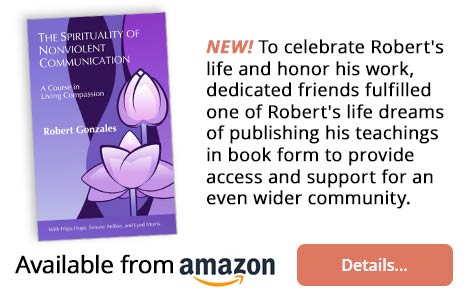

Welcome to the Robert Gonzales Training Legacy. Here you can learn more about Robert and the powerful teachings he dedicated his life to. NVC Academy is proud to house and share with you the complete body of his life's work. We invite you to explore, learn, and help keep his legacy alive!
Robert's passion was in the spirituality of the Nonviolent Communication (NVC) process. He saw NVC both as a process that helps people connect more authentically with themselves and others, and as a spiritual practice and way of living. The worldwide NVC community mourned when Robert died in 2021. He left behind a legacy of work that emerged from a lifetime of inquiry into the intersection between spirituality and human communication. More about Robert.
Article
5-7 minutes
With a world in crisis, steeped in incomprehensible violence, how do we then live? What, if anything, could turn this around? If we're all dying, let us die loving everyone, including ourselves and our former enemies. Let us come together behind wanting everyone to be free. Let us align means with ends as we envision a world that, against all odds, moves towards working for all of life. Let us dedicate our lives to service, to courage, to speaking truth, and to love.
Details...Trainer Tip
1-2 minutes
Trainer Tip: When you suspect someone is lying, consider how it may be less important what the truth is. Instead, notice whether your need for trust is met. Without blame, nor labelling. you can make specific requests to meet your needs, while also respecting the other person’s needs. Read on for more.
Details...Article
6 - 9 minutes
Anger can alert us that a need may be threatened. When anger lives in someone as a well-worn habit, it arises from a place of dissociation from one’s heart and is entangled with misinterpretations, a deep sense of threat, a history of pain, and social conditioning that isn’t life-serving. Read on for how intention, mindfulness, and specific actions can change that habit.
Details...Article
5 - 8 minutes
An addiction to something (eg. opioids, fats, sugars, salts, cigarettes, coffee, alcohol, etc.) or a compulsion (eg. gambling, shopping, working, sex or love addictions) is often an unconscious attempt to soothe trauma - fear, loneliness and shame that's frozen in unconscious memory. The addiction or compulsion is a substitute for what we really need. It is an endless craving that's never enough. Read on for more.
Details...Trainer Tip
1 - 2 minutes
Trainer Tip: When looking for a solution take the time to consider and connect to other's needs rather than just focusing on getting what you want. Such a basic shift in consciousness can make a profound difference in your relationships, both personal and professional. Notice how you feel afterward.
Details...Trainer Tip
1 - 2 minutes
Trainer Tip: Make a boring or "dead" conversation more interesting, meaningful and connecting. You can do this by connecting to the other person’s feelings, passions or desires. Read on for examples.
Details...Article
5- 8 minutes
Repairing betrayal may include rebuilding self trust, getting support, empathy on both sides over time, and new agreements. Even though your (in)actions don't "cause" someone's behavior, acknowledging any part you played in creating conditions for the behaviors to arise, can support repair. Trust builds slowly as new skills, ways of relating and experiences that reflect honesty, self responsibility, and respect are consistent over time.
Details...Article
39 - 60 minutes
If we're to have a better future, our biggest task will be to reexamine what the police are, their place in the system, and more. Police violence exists by systemic design. The myths of where the problems and symptoms lie with the police, capitalism, laws, government, citizens, class and racism --plus the relationship between all these-- is what keeps oppression ongoing on a mass scale. For change to happen, we'll need to find systemic leverage points, and use privilege to benefit those without it. Read on for more.
Details...Trainer Tip
1 - 2 minutes
Trainer Tip: Changing your thoughts can change the way people experience you. Just for today, see if you can notice when you have judgmental thoughts about yourself or other people. Then look to translate those thoughts into your feelings and needs. Read on for an example of how this works.
Details...Article
4- 6 minutes
If you ask for or give empathy and are met with accusations of codependency, there are a number of things you can do to check that you are coming from a place of healthy differentiation. You can see if you're doing so from a place of healthy differentiation -- and notice signs of healthy differentiation when you offer empathy. You can also bring a profound respect for differences, and clear boundaries. Read on for more.
Details...

